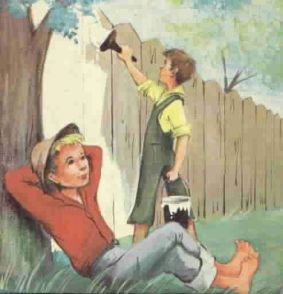Nicholas Nickleby, Tom Sawyer, Anna Karenina, Jane Eyre—people remember those fictional characters’ names because they are also the titles of books. Character’s names from books that were made into movies—James Bond, Jack Ryan, Scarlett O’Hara, Scout—are memorable because we see the movies over and over, and the characters are referenced again and again. 
What characters do people remember from books that have not become movies or book titles? Or do they remember the names? Are the names of some book characters memorable because they are distinctive, or do people remember monikers only if they’ve seen them often?
I did a little casual research by asking my friends what character names they remember. Men remembered the names of male characters, especially those from books that are also movies. Women tended to remember the names of female characters. They also came up with the names of characters from children’s books, having been reminded from reading books to their children and grandchildren.
The names these people remembered weren’t necessarily unusual; rather, the characters were exciting and special. No one came up with a long list of names. They were more likely to say something like, “Oh, you know, the main gal in Gone Girl. What was her name? “
So—are authors wise to be creative when choosing character names? Scout is unusual, as are Sherlock and Huckleberry, and there’s Goldie, the name of Diane Mott Davidson’s culinary sleuth. Clive Cussler’s Dirk Pitt—well, both the author’s pen name and the name of the author’s super investigator are out of the ordinary. My question is: would those characters be just as memorable with names like Kinsey (Sue Grafton’s sleuth), Meg, Jo, Beth, Amy (from Little Women), or Harry ( of Harry Potter fame)?
I remember some characters’ names (mostly female) because I’ve read a whole series with the same main character—Kinsey Milhone, Goldie Schultz, Stephanie Plum, Bilbo Baggins, Henry Huggins. The main character in the book Delicious is Wilhelmina, nicknamed Billie. I loved the character, and her name is fresh in my memory because I recently read the book, and the author made so much of the name. But, a year from now, will I remember the name or just the attributes of the character? James R. Callen’s Father Frank is a wonderful character, one I remember vividly. Nevertheless, even though I know the character is a caring, charismatic, basketball-playing priest who solves mysteries, I had to look back in the book to remember the name Frank.
An author should use common sense and follow the rules. Use names appropriate for the character’s age, unless you are going for a name appropriate for the headmaster of the wizard school, Hogwarts, in which case Aldus Dumbledore works, or for the name of a small, slimy creature in a fantasy series, where Gollum is perfect.
Don’t give important characters names which are too similar. That could be disastrous. In one draft of my mystery, CATastrophic Connections, I realized I had a Libby, an Abby, and a Liz. No problem, right? Make a global change—Find and Replace All—with new names. However, when I changed Liz to Lisa, I didn’t leave a space before and after Liz. The liz in every word containing those contingent letters changed to lisa. Civilize became civilisa, and realized changed to realisaed.
To add to the calamity, I accidentally changed Abby to Beth when I wanted Libby to become Beth. When I went back and made my intended change, I ended up with two characters having the same name. After hours and hours of manually changing the mistakes, the first publication of the book still contained two Beths which should have been Abby. Mistakes my editor didn’t find. Drat. Learning curves can be painful.
Most of the characters of my second book, FURtive Investigation, have had unusual names from the beginning, and I didn’t change them. Lesson learned. The title, on the other hand…
What book character names do you remember without looking them up? Why? How do you choose the names for characters in your stories and books? Are there any characters you would have given a different name?




I have a problem with alliteration. For instance, currently I’m gearing up to write my third Calendar mystery, Mischief in March, and before I knew it, besides my protagonist whose name is Minty, I also had a Milton Mathison, a Maude, and a Melicent nicknamed Melly. I’ve since redubbed the Maude to Isabella and the Melly to Victoria.
LikeLike
It’s amazing how hard it can be to name a character. We shouldn’t be surprised, though. Think how much time and thought people put into naming their children! Your alliteration story is a new one–funny.
LikeLike
Whoa! Lots of complications there. I can’t believe you had to go back and sort out the difference between characters! How frustrating! And finding a name within words? argh. I’d go crazy I think!
Either way your post makes a valid point. Names are important to a small degree. At the point in which your reader doesn’t remember who is who, you have a problem. (And I’ve read books like that.) Alternatively, if you use a boring name, your character may not be remembered. Of course, do you care if the character is remembered? Maybe the story is beyond him/her; maybe you are trying to get across a point through the character’s story rather than making the character the point?
Anyway, awesome blog post. Really made me think. Thanks for sharing! 🙂
LikeLike
Thanks for the valuable comment. That a character’s name can be forgetable as long as the theme is clear makes sense.
LikeLike